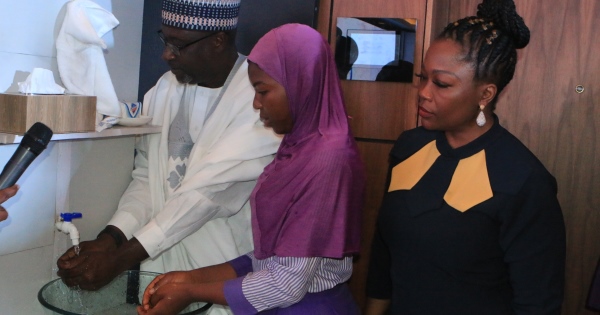General News
P&G Joins Force With Global Citizen to Combat Social Challenges with ‘ACTIVATE’ Series

Procter & Gamble, leading manufacturer of consumer goods in Nigeria, recently hosted the screening of the sixth episode of the series, ACTIVATE, in commemoration of Global Hand Washing Day, to promote sanitation, hand washing and clean water in Nigeria.
The pre-screening of the documentary’s finale was held at the Transcorp Hilton hotel, in Abuja. The event, which was attended by notable stakeholders, was under the distinguished chairmanship of the Honorable Minister of Water Resources, Engineer Suleiman Adamu, and served as a call to action for other global practices designed to create awareness and solutions for effective, sustainable change around the world. .
The ACTIVATE series – bolstered by custom content distributed across National Geographic’s unrivaled social, digital, linear and print channels – has its core focus on global challenges associated with extreme poverty, inequality and sustainability issues to mobilize people across the world to drive meaningful and lasting change. The six-part documentary series explores on-going major advocacy campaigns aimed to impact marginalized people in the world and is available on National Geographic in 172 countries and 43 languages.
In his keynote address, Engineer Suleiman Adamu, the Honourable Minister of Water Resources, said: “We need to prioritize hand washing and sanitation issues in Nigeria as it has enormous benefits for not just our environment but also improves quality of lives greatly.
“I have to commend P&G and its partners for this wonderful collaborative imitative and the assured support for such programs over the years. The Ministry of Water Resources wholly supports their effort and will continue to lend its voices in ways that are impactful.”
Commenting at the screening, the Director, Global Relations and Public Policty, P&G Africa, Temitope Iluyemi said, “At P&G, we are concerned with not just improving the well being of people directly through the quality of our products, but also believe strongly in impacting the lives of the people who live in the countries we operate.
“The Activate series is one of Procter & Gamble’s numerous demonstrations that people are at the forefront of why we do what we do. Our goal is to promote a global culture and raise awareness of the benefits of hand washing with soap Safe guarding our environment requires collective effort and we are happy to champion this cause and encourage as many people that are willing, to spread the message. ACTIVATE is the result of people going out there to do the work.”
Speaking on the strategic partnership to mobilize global action, Chebet Chikumbu, the Africa Director, Global Citizen, said; “From Mexico to Philippines to South Africa and Nigeria, global citizens fighting inequality and extreme poverty in a variety of ways. The ACTIVATE series is a tool for empowerment for players involved on different scales.
“We are empowering the poor by amplifying their voices and providing them a platform to tell their stories. As these stories are transmitted, we are also empowering the recipients of these messages to go out into the world to make a lasting change, motivated and inspired by the stories they have heard.”
In 2008, the initiative to promote sanitation through hand washing was launched with a Global Hand washing Day (GHD), and it is now celebrated every year on October 15. Following this, P&G Nigeria has also kick started another water based initiative, ‘STOP THE GERMS, NOT THE KIDS’, in partnership with Safeguard to promote hand washing amongst kids in Nigeria.
General News
Nigerian Military Makes History with Africa’s First Attack Drones, Bombs

Nigerian Military, in partnership with Briech UAS, a communications company, has unveiled the first and largest indigenous attack drones and bombs in Nigeria and Africa.

Briech UAS, alongside the Nigerian Army, demonstrated these attack drones and bombs at the company’s headquarters in Abuja on Wednesday.
General Christopher Musa, chief of Defence Staff (CDS), hailed the initiative as a significant milestone in Nigeria’s progress toward self-reliance in defence technology and a crucial step in enhancing national security.
Musa highlighted the importance of developing combat drones, particularly for intelligence gathering. He pointed out that these drones would play a pivotal role in addressing complex and asymmetric security threats.
“These force multipliers will greatly enhance the operational effectiveness of our military, especially in a world where global politics complicate the procurement of advanced military hardware,” he stated.
“Countries that do not produce these solutions face bureaucratic and diplomatic challenges when acquiring essential platforms. We are directly addressing this challenge.
“If we do not produce what we need, we will be at the mercy of others, even if we have the financial resources to acquire them.
“By manufacturing these drones locally, Nigeria reduces dependence on foreign resources, ensures faster acquisition, and strengthens its ability to respond to security threats swiftly.
“With the brilliant minds we have, particularly among our youth, we can create outstanding technology that competes on a global scale,” Musa said.
Plateau Governor Caleb Mutfwang underlined the importance of supporting indigenous products for Nigeria’s growth.
He stressed that the drones would be vital in safeguarding the country’s sovereignty, particularly in Plateau State, where some of these technologies have already been deployed to enhance the efficiency of ground forces.
Mutfwang also revealed that his state was collaborating with local bomb and drone manufacturers like Briech UAS to counter insurgency with domestically produced weapons.
“As a nation, we made a mistake by allowing non-state actors to acquire capabilities nearly on par with state actors,” he stated.
“We’ve entered into a partnership that has led to the deployment of these facilities in our state. We’ve seen substantial improvements in the effectiveness of our security forces.
“It was a mistake to let non-state actors gather capabilities that could almost overpower legitimate state forces. We must correct that imbalance.
“We must ensure no one within our borders has capabilities that surpass or match those responsible for protecting our national sovereignty,” he added.
Earlier, Dr Bright Echefu, chairman of Briech UAS, noted that insurgent groups like Boko Haram and ISWAP have been using commercial drones for reconnaissance and attacks.
“These drones have been used to track and attack our troops, coordinating ambushes and executing crude aerial strikes,” he said.
General News
FG Trains 49 Persons with Disabilities in IT Skills

Digital Bridge Institute (DBI), has trained and graduated 49 persons with disabilities (PWDs) from a nine-month IT programme aimed at bridging Nigeria’s digital divide.

The graduates, comprising 24 from DBI’s Lagos campus and 25 from its Kano campus, acquired industry-recognized certifications and essential digital skills to enhance their participation in the tech sector.
The IT Bridge Academy, a federal government initiative designed to support PWDs, provides specialized training to help them access opportunities in the modern digital economy.
The programme was implemented in partnership with Sightsavers International and is only the second of its kind in Africa, after a similar initiative in Kenya.
At the Lagos graduation ceremony, David Daser, president and CEO, DBI, represented by Viola Askia-Usoro, institute’s head of special duties, described the initiative as a major step towards digital inclusion.
“This academy is not just about education; it’s about creating opportunities for PWDs to realize their full potential,” he stated, highlighting the programme’s role in tackling stigma, discrimination, and limited access to training.
Daser urged the graduates to advocate for digital accessibility and called on public and private sector stakeholders to support inclusive initiatives that empower PWDs in Nigeria’s technology space.
Speaking on behalf of the graduates, cohort 2 class governor Amos Adegboyega acknowledged the challenges they faced during the programme and expressed gratitude for the support received, saying, “There are abilities in disability, and this training has given us the confidence to achieve our dreams.”
General News
Financial Cyberthreats Report Reveals 3.6Ttimes Surge in Mobile Banking Malware

As digital financial transactions continued to expand worldwide, cybercriminals shifted their focus toward mobile devices and crypto assets. According to Kaspersky’s new Financial Cyberthreats report, the number of users encountering mobile banking Trojans rose by 3.6 times compared to 2023, while crypto‑related phishing detections climbed by 83.4%.

Meanwhile, PC‑focused malware saw a decline in traditional banking attacks but a surge in crypto‑asset theft. This data comes from Kaspersky’s new Financial Cyberthreats report for 2024.
Financial phishing
In 2024, online fraudsters continued to lure users to phishing and scam pages that mimicked the websites of popular brands and financial organisations. Banks were the most popular lure in 2024, accounting for 42.6% of financial phishing attempts (compared to 38.5% in 2023).
Amazon Online Shopping was mimicked by 33.2% of all phishing and scam pages targeting online store users in 2024, making it the most popular online brand target for fraudsters.
Apple’s share of attacks dropped nearly 3 p.p. on last year’s figure to 15.7%, while Netflix scams grew slightly to 16%. Meanwhile, fraudsters’ interest in the Alibaba marketplace increased, its share going up from 3.2% in 2023 to 8% in 2024.
Payment systems were mimicked in 19.3% of financial phishing attacks detected and blocked by Kaspersky products in 2024 (19.9% in 2023). Once again PayPal was the most targeted brand, however, the ratio of attacks related to it fell from 54.7% to 37.5%.
Attacks targeting Mastercard, on the contrary, nearly doubled from 16.6% in 2023 to 30.5% in 2024. American Express and Cielo are the new entrants into the top five replacing Visa, Interac and PayPay.
In 2024, the number of phishing and scam attacks related to cryptocurrencies saw a whopping increase. Kaspersky antiphishing technologies prevented 10,706,340 attempts to follow a cryptocurrency-themed phishing link, an 83.4% increase over the 2023 figure of 5,838,499. As cryptocurrency popularity continues to grow, the number of attacks is only ever going to get larger.
Financial malware for PCs
While the number of users who encountered mobile banking malware increased, the share of those who were affected by financial PC malware decreased from 312,453 in 2023 to 199,204 in 2024.
Currently most financial PC malware that Kaspersky detects is targeting not online banking, but crypto assets. The banking Trojans that were most often detected in 2024 included ClipBanker (62.9%), Grandoreiro (17.1%), CliptoShuffler (9.5%) and BitStealer (1.3%). Grandoreiro is a full-fledged banking Trojan that targeted 1,700 banks and 276 crypto wallets in 45 countries and territories around the globe in 2024.
Mobile financial threats
In 2024, the number of users who encountered mobile banking Trojans grew 3.6 times compared to 2023: from 69,200 to 247,949, with malicious activity significantly increasing in the second half of 2024.
The most active Trojan-Banker family in 2024 was Mamont (36.7%). Its distribution schemes ranged from simple scams to complex social engineering plots with fake stores and delivery tracking apps.
“In 2024, financial phishing and scams increased in numbers and reached a new level of sophistication, unleashing waves of attacks on users. Fraudsters are increasingly leveraging fake brands and services to get user data, and the popularity of smartphones for financial transactions only fuels their appetite.
Looking ahead, we expect financial phishing to become even more personalised and targeted, focusing on exploiting vulnerabilities in everyday digital habits, which will demand increased vigilance and thorough approaches to protection,” comments Olga Svistunova, senior web content analyst at Kaspersky.

 Broadcasting2 days ago
Broadcasting2 days agoDStv Revenue Plunges as MultiChoice Loses Nearly 4m Subscribers

 Telecom2 days ago
Telecom2 days agoNCC Asks Consumers to Monitor Data Usage to Authenticate Consumption

 News1 day ago
News1 day agoNIPSS Projects Petrol Prices to Hit ₦750/Litre Before Year’s End!

 Telecom2 days ago
Telecom2 days agoPhone Theft: AMCODET Urges Mandatory Registration @ Point of Purchase

 News2 days ago
News2 days agoTikTok Sale Deal Expected Before April 5 Deadline – Trump

 News2 days ago
News2 days agoQuestions Over House of Reps Threat to Arrest NIMC DG

 E-Financial2 days ago
E-Financial2 days agoFidelity Bank Records a 210.0% Growth in PBT to N385.2bn

 Telecom2 days ago
Telecom2 days agoCassava and Microsoft Boost Youth Employment in Green Tech



























